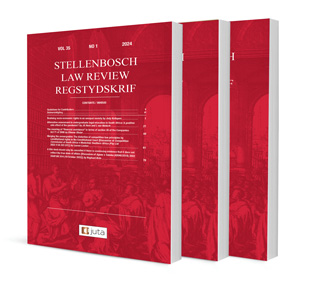Merging the unmergeable: The distortion of competition law principles by constitutional rights in the Constitutional Court [Discussion of Competition Commission of South Africa v Mediclinic Southern Africa (Pty) Ltd 2022 4 SA 323 (CC)]

Merging the unmergeable: The distortion of competition law principles by constitutional rights in the Constitutional Court [Discussion of Competition Commission of South Africa v Mediclinic Southern Africa (Pty) Ltd 2022 4 SA 323 (CC)]
Author: Lauren Loxton
ISSN: 1996-2193
Affiliations:BCom PPE LLB, BCL, Researcher, South African Institute for Advanced Constitutional, Public, Human Rights and International Law (SAIFAC), University of Johannesburg
Source: Stellenbosch Law Review, Volume 35 Issue 1, 2024, p. 61 – 77
https://doi.org/10.47348/SLR/2024/i1a4
Abstract
The aspirations of the Constitution of the Republic of South Africa, 1996 are expressly recognised in competition legislation. Competition authorities and courts must, accordingly, adjudicate competition matters in a manner that gives effect to the Constitution. This has resulted in the Constitutional Court assuming jurisdiction over appeals from the Competition Appeal Court, thereby raising questions about the Constitutional Court’s competence to adjudicate specialised competition matters that cannot be understood solely through the lens of constitutional interpretation. The Constitutional Court’s decision in Competition Commission of South Africa v Mediclinic Southern Africa (Pty) Ltd 2022 4 SA 323 (CC) is a cautionary tale that exposes the dangers that arise when the Court enters this specialised realm of the law and imposes constitutional interpretation without engaging with the principles of competition law.
The case concerned a dispute about whether a merger in the healthcare sector would lead to an increase in the price of healthcare. The Constitutional Court’s judgment emphasises the constitutional imperative to quell the harmful effects of the inequalities that loom over South Africa’s post-apartheid economy, but it is not legally sound in all respects. This note explores the weaknesses in the judgment under the following themes: the approach to jurisdiction that contradicts jurisprudence and untenably extends the Constitutional Court’s jurisdiction; the problematic assertion that precedent severely constrains the appellate powers of the Competition Appeal Court; and the Constitutional Court’s inconsistent appreciation of the specialised nature of competition law and its consequent failure to engage with the evidence.
This analysis concludes that this attempt to import constitutional rights into competition law, without adequately engaging with competition law itself, reveals an urgent need to re-examine the true scope of the Constitutional Court’s jurisdiction and its powers to adjudicate complex and highly specialised areas of the law.
